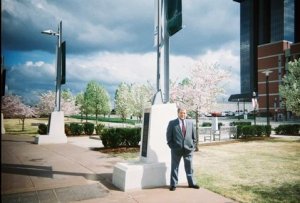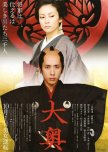"Never Shall I Speak Of Things I Have Seen Or Heard Inside The Inner Chambers"
Alternative title: Lady Shōgun and her Men
This story revolves loosely around the Ejima-Ikushima affair of 1714, the most significant scandal in the history of Ooku, the shogun's harem, during the Edo period of the history of Japan...but with a twist!
In a 'reverse' timeline history, the Japanese Edo period is ran by powerful women instead of men.
In 1716 a contagious - for men, that is - disease hits Japan changing the ratio of men to women to 1:4 .
Women become the dominant part of society and men dress up like geishas to attract women.
With the drastic reduction of men, the gender roles have become reversed in Japan. Woman become the dominant members of society and males are sought out for the ability to produce children.
A young, handsome member of a poor family, Unoshin Mizuno (Ninomiya Kazunari) is at the age he must make major decisions about his future; he has several things going for him, but his social status presents him from taking advantage of them:
He is skilled in kendo, has a beautiful girlfriend and is 'giving' to those around him who have less.
But his girlfriend Onobu (Horikita Maki), even though they love each other, is beyond his social status and he is not interested in the marriage offers he is given through his family. He also is worried about his younger sisters marriage dowry.
He decides to join the Ooku, kept men (think of royal 'male concubines') who are at the service of the Lady Shōgun of the clan; even though the present one is only seven (7) years old at present. This decision is heartbreaking news to Onobu who longs for him and no other.
Inside the Ooku, Mizuno writes Onobu that even though the men are all handsome, their hearts are 'all dark'; this is shown through a kendo match between him and Tsuroka (Okura Tadayoshi), who loses his prominence in the ooku by being bested by Mizuno.
However, the unplanned and sudden death of the child shogun brings to the position a more mature, no-nonsense and powerful woman shogun Tokugawa Yoshimune (Shibasaki Ko) who is seen by the Ooku members as a chance for rapid promotion and fulfillment of his personal power ambitions!
Matsushima (Tamaki Hiroshi) the senior 'man' in the Ooku, elevates Mizuno above others, but not necessarily for his own good!
However, the powerful but non-traditional new Shogun has her own ideas about what should be done and how, and several plot twists leave most with a satisfactory outcome!
Some do not consider this ' Sci-Fi' for this movie: however, SciFi has to do aas much with mutant diseases as well as futuristic scenarios as anything else: why can't this be considered SciFi i that it introduces a zombie-like disease and change Japanese history? That is what this movie does!
I also love the depth to which this story for this movie is written! I also like the very colorful artistic cinematography, music and the depth of the 'detail' used to bring this scifi/historical movie to fruition!
Care was taken to make each and every passing season and scene just as colorful and brilliant as the last one shot for this movie!
And even more, the acting was superb! The main and support cast worked together as if they actually lived in such an environment with superb support from the theatrical, lighting and other unmentioned departments.
This movie was also very emotional at times witht eh cast pulling off the emotion emphatically and on cue. Personally, I think that the characters are very well developed because they are complex, deceptive and quite multi-dimensional in their basic human drives.
They make sense within the constraints in which they are cast withing the Ooku. We get the full spectrum of emotions within this movie; varied scenery and ambiance in all the right places, multiple stories occurring at the same time but not overpowering the main story at the same time; realistic characters, with a realistic society portrait of the period, and so on.
Certainly, this movie has strong characters, but like the inner chambers of any Shogun's castle, they are puppets vowing for more power. Along with intense & emotional moments, it concludes with a mind blowing twist by the female Shogun that I personally didn't see coming!
The set and costume designers should take a hell of a lot of pride in what they did with this movie!
You actually believe that you are in the Japanese "Forbidden City" and being a welcomed voyeur into the intricate machinery of its operation.
Overall, it's an entertaining movie with an understandable story and believable characters that no Asian movie lover should miss!
My only problem with this movie is that the director, after making sure that the movie was built on a firm and lasting cinematogrpahy, music and such, tended to rush the scenes and story a bit.
Had he pulled a " Kurosawa Akira" and spent a little more time on developing the characters and back story, we might just be looking about another epic movie from Japan!
+++++++++++++++++++++++++++++++++++++++++++++++++++++++++++++++++++++++++++++++++++++
A ten episode drama, 大奥〜誕生[有功・家光篇] aired on TBS between October 12, 2012 and December 14, 2012, starring Masato Sakai and Mikako Tabe is also available for viewers.
Ōoku: The Inner Chambers is set in an alternate Edo period of Japan, where a strange disease that only affects men has caused a massive reduction of the male population, changing the Japanese social structure as women have to fill traditionally male roles. Eighty years after the initial outbreak, with four women for every one man, Japan has become completely matriarchal with women holding important political positions and men being their consorts. The most powerful woman — the shōgun of the Tokugawa shogunate — keeps a harem of handsome yet unproductive men known as the Ōoku inside Edo Castle.
This story revolves loosely around the Ejima-Ikushima affair of 1714, the most significant scandal in the history of Ooku, the shogun's harem, during the Edo period of the history of Japan...but with a twist!
In a 'reverse' timeline history, the Japanese Edo period is ran by powerful women instead of men.
In 1716 a contagious - for men, that is - disease hits Japan changing the ratio of men to women to 1:4 .
Women become the dominant part of society and men dress up like geishas to attract women.
With the drastic reduction of men, the gender roles have become reversed in Japan. Woman become the dominant members of society and males are sought out for the ability to produce children.
A young, handsome member of a poor family, Unoshin Mizuno (Ninomiya Kazunari) is at the age he must make major decisions about his future; he has several things going for him, but his social status presents him from taking advantage of them:
He is skilled in kendo, has a beautiful girlfriend and is 'giving' to those around him who have less.
But his girlfriend Onobu (Horikita Maki), even though they love each other, is beyond his social status and he is not interested in the marriage offers he is given through his family. He also is worried about his younger sisters marriage dowry.
He decides to join the Ooku, kept men (think of royal 'male concubines') who are at the service of the Lady Shōgun of the clan; even though the present one is only seven (7) years old at present. This decision is heartbreaking news to Onobu who longs for him and no other.
Inside the Ooku, Mizuno writes Onobu that even though the men are all handsome, their hearts are 'all dark'; this is shown through a kendo match between him and Tsuroka (Okura Tadayoshi), who loses his prominence in the ooku by being bested by Mizuno.
However, the unplanned and sudden death of the child shogun brings to the position a more mature, no-nonsense and powerful woman shogun Tokugawa Yoshimune (Shibasaki Ko) who is seen by the Ooku members as a chance for rapid promotion and fulfillment of his personal power ambitions!
Matsushima (Tamaki Hiroshi) the senior 'man' in the Ooku, elevates Mizuno above others, but not necessarily for his own good!
However, the powerful but non-traditional new Shogun has her own ideas about what should be done and how, and several plot twists leave most with a satisfactory outcome!
Some do not consider this ' Sci-Fi' for this movie: however, SciFi has to do aas much with mutant diseases as well as futuristic scenarios as anything else: why can't this be considered SciFi i that it introduces a zombie-like disease and change Japanese history? That is what this movie does!
I also love the depth to which this story for this movie is written! I also like the very colorful artistic cinematography, music and the depth of the 'detail' used to bring this scifi/historical movie to fruition!
Care was taken to make each and every passing season and scene just as colorful and brilliant as the last one shot for this movie!
And even more, the acting was superb! The main and support cast worked together as if they actually lived in such an environment with superb support from the theatrical, lighting and other unmentioned departments.
This movie was also very emotional at times witht eh cast pulling off the emotion emphatically and on cue. Personally, I think that the characters are very well developed because they are complex, deceptive and quite multi-dimensional in their basic human drives.
They make sense within the constraints in which they are cast withing the Ooku. We get the full spectrum of emotions within this movie; varied scenery and ambiance in all the right places, multiple stories occurring at the same time but not overpowering the main story at the same time; realistic characters, with a realistic society portrait of the period, and so on.
Certainly, this movie has strong characters, but like the inner chambers of any Shogun's castle, they are puppets vowing for more power. Along with intense & emotional moments, it concludes with a mind blowing twist by the female Shogun that I personally didn't see coming!
The set and costume designers should take a hell of a lot of pride in what they did with this movie!
You actually believe that you are in the Japanese "Forbidden City" and being a welcomed voyeur into the intricate machinery of its operation.
Overall, it's an entertaining movie with an understandable story and believable characters that no Asian movie lover should miss!
My only problem with this movie is that the director, after making sure that the movie was built on a firm and lasting cinematogrpahy, music and such, tended to rush the scenes and story a bit.
Had he pulled a " Kurosawa Akira" and spent a little more time on developing the characters and back story, we might just be looking about another epic movie from Japan!
+++++++++++++++++++++++++++++++++++++++++++++++++++++++++++++++++++++++++++++++++++++
A ten episode drama, 大奥〜誕生[有功・家光篇] aired on TBS between October 12, 2012 and December 14, 2012, starring Masato Sakai and Mikako Tabe is also available for viewers.
Ōoku: The Inner Chambers is set in an alternate Edo period of Japan, where a strange disease that only affects men has caused a massive reduction of the male population, changing the Japanese social structure as women have to fill traditionally male roles. Eighty years after the initial outbreak, with four women for every one man, Japan has become completely matriarchal with women holding important political positions and men being their consorts. The most powerful woman — the shōgun of the Tokugawa shogunate — keeps a harem of handsome yet unproductive men known as the Ōoku inside Edo Castle.
Cet avis était-il utile?













